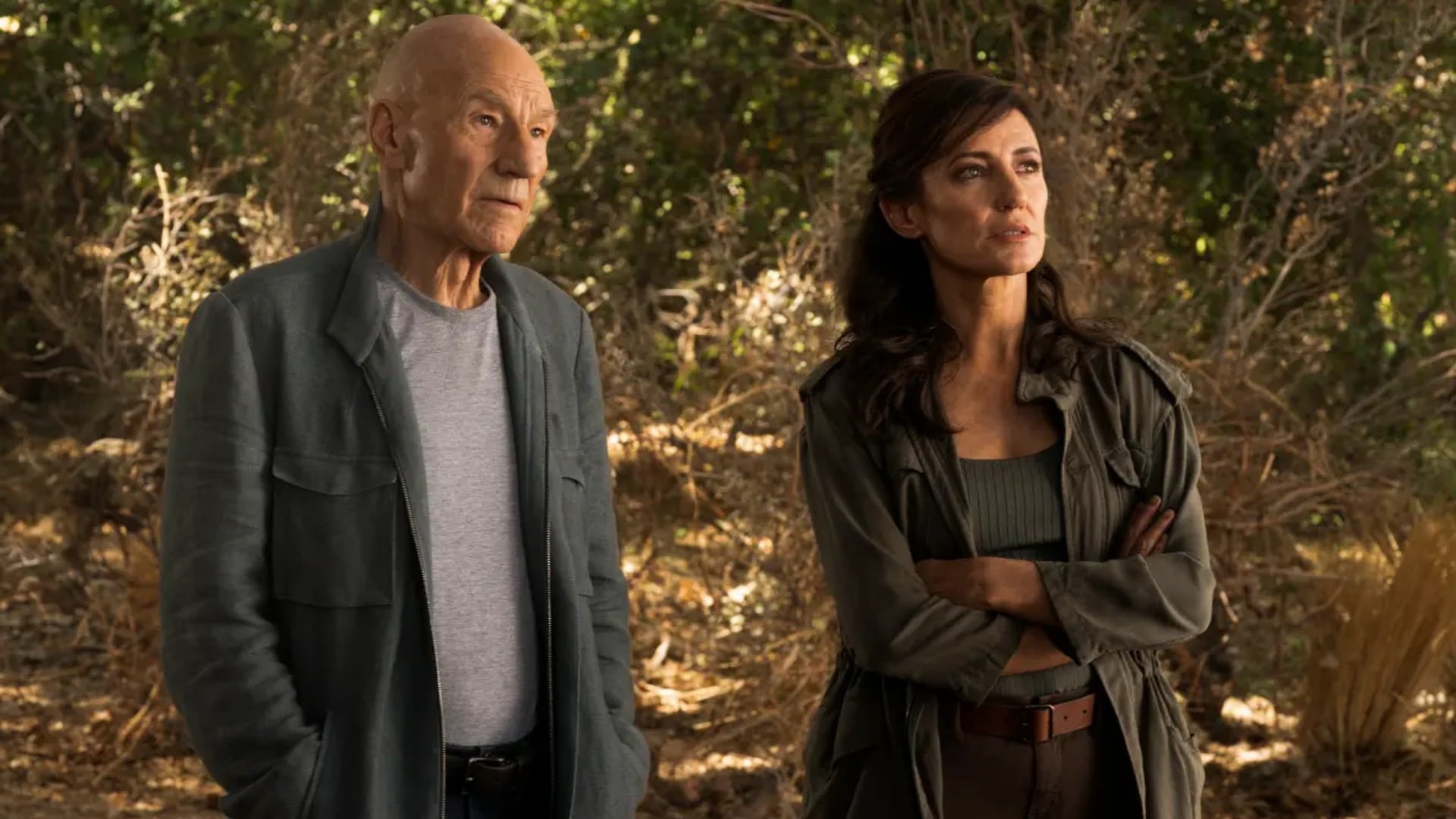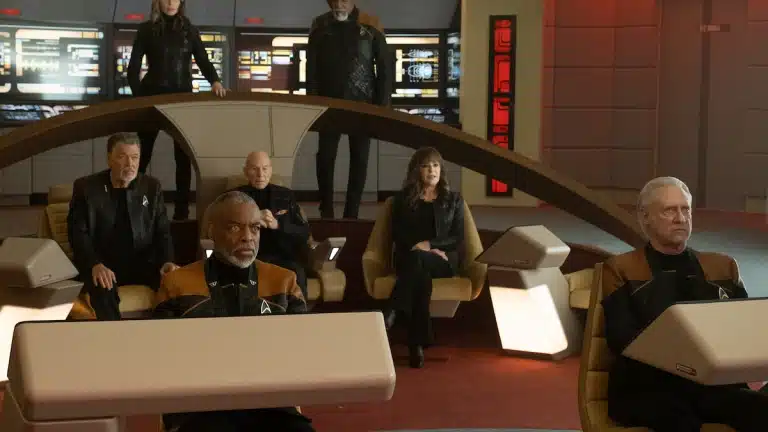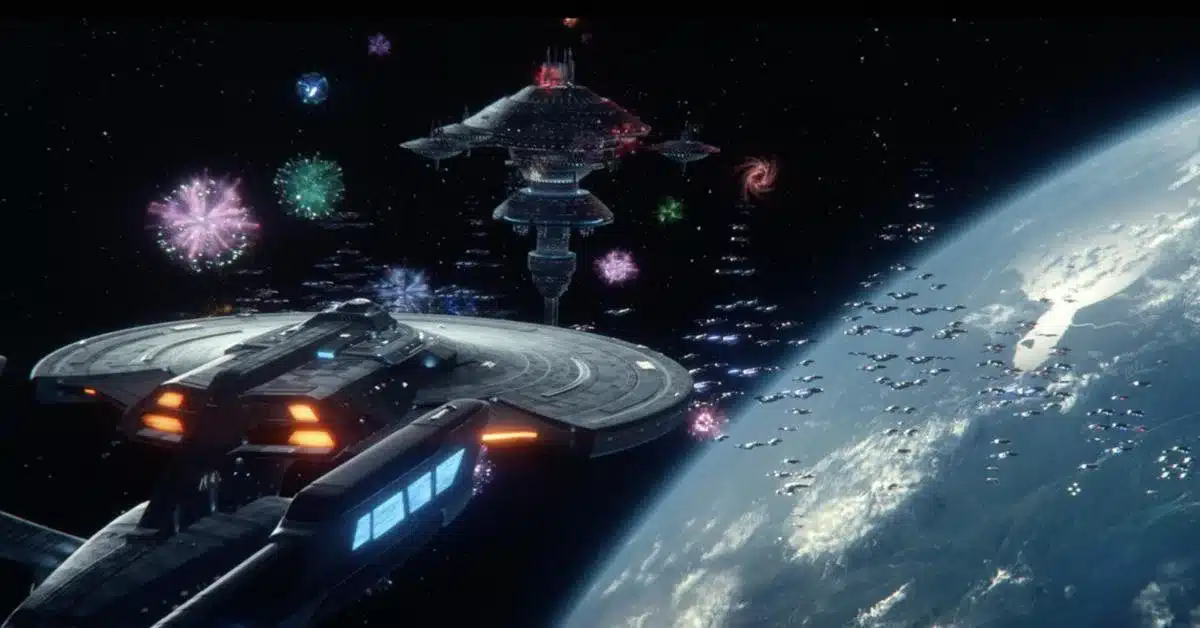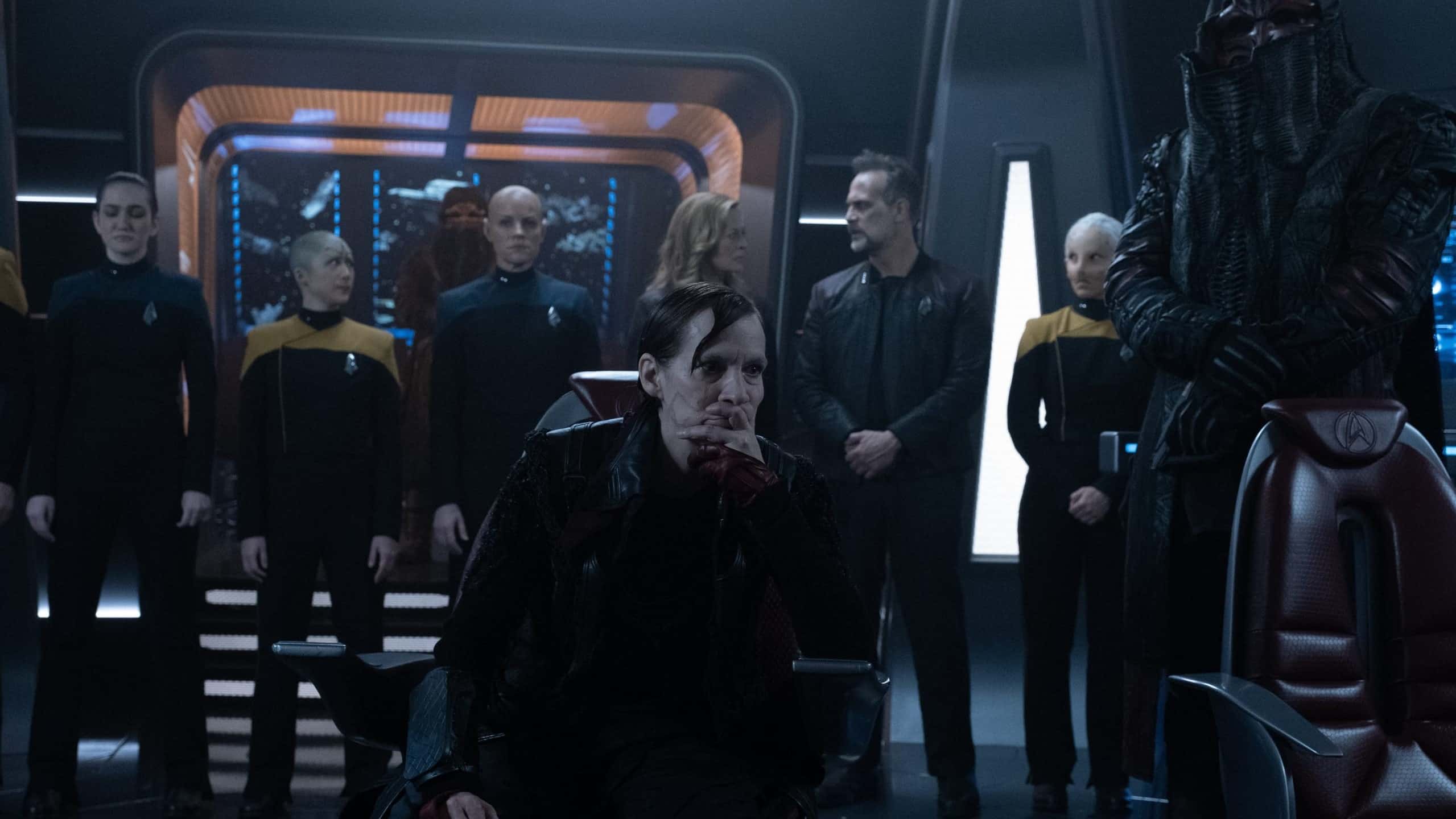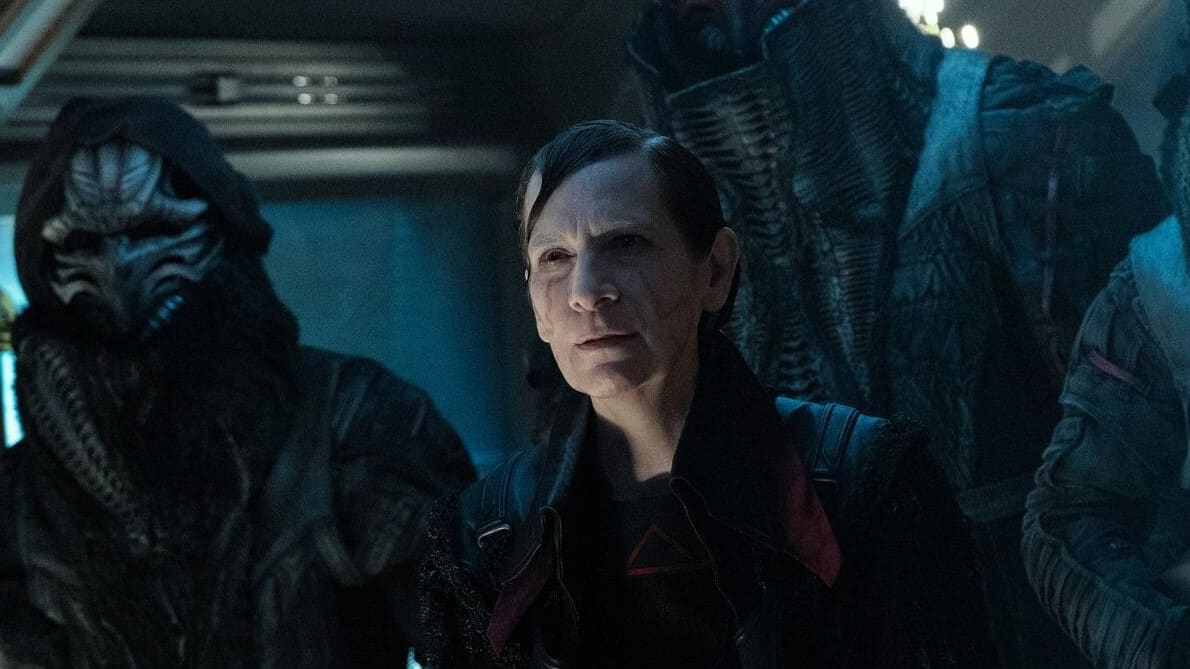In “Hide and Seek,” Picard confronts the demons of his past, Adam Soong confronts his legacy, Rios confronts the grandfather paradox, Raffi and Seven confront the Borg Queen, who is busy confronting the woman inside her. Written by Matt Okumura & Chris Derrick, directed by Michael Weaver.
CW: Discussion of suicide and mental illness.
Mark Turetsky: Things are starting to wrap up with Picard and the gang, and check it out! It looks like your theory about Jurati becoming the shrouded Borg Queen of the 25th century is coming true!
Will Nevin: Call it Ensign Pavel Chekov’s Shrouded Borg Queen. There was always going to be a reason we didn’t see her face. But don’t forget: My first idea was that it was Picard’s mom.

Mark: Clearly a misdirect! Shall we get into it?
Will: Space turtle power!
The Catacombs of Memory
Mark: The bulk of the plot of this episode is Dr. Jurati’s Borg Queen leading an assault on the La Sirena to commandeer the ship, while Dr. Soong leads a team of Borg to kill Picard’s gang at the Château.
Will: A spot-on description that encapsulates the whole while also not getting across how unnecessary — aside from the big reveal about Picard’s past — the whole endeavor felt. Nothing, save perhaps Star Trek Into Darkness, can touch the miserableness of last season’s “Stardust City Rag,” but this felt like an ebb.
Mark: Let’s get into that big reveal. It was clear a couple of weeks back when Picard dismissed Tallinn’s questions about their dive into Picard’s memory that the story wasn’t over yet. Here, we learn that a young Jean-Luc Picard let his mother out of her locked room and therefore gave her the means to take her own life. All at once, it explains so much about Picard. Why he has trouble with deep attachments, why he tried to get as far as possible from his childhood home, his guilt about his family line.

Will: You’re right that Tallinn flagged for us that there was more to the story, but I wasn’t sure whether that was more overt abuse from Maurice or some other sad end — it wasn’t until she said basically “remember me as I once was” that I began to suspect suicide. I’d bet all the gold-pressed latinum in the Alpha Quadrant that this wasn’t the idea from the character’s beginning (“There’s no suicide in the future,” as I imagine yet another bad idea coming out of Gene Roddenberry’s mouth), but it does a lot to explain who that innocent boy would become.
Mark: I can definitely see Picard transferring his self-imposed guilt for his mother’s fate onto his father. Had he confronted his past trauma earlier in his life, he might have reconciled with Maurice, or his brother Robert, but it wasn’t to be. Instead, they likely both blamed each other for the rest of their lives. I also get the impression that Picard’s dream of being in his Enterprise-E ready room with a Starfleet counselor might be the last time he spoke with someone about his mother’s death. Surely, Starfleet would have known about it and had some concern about the lasting effects of said trauma on his ability to command.
Will: Agreed. This is not something he could have kept a secret even if he wanted to. I think it’s important here to recognize that this is not something shameful. It happens. It’s tragic. And I hope anyone who might read this and is dealing with these issues gets the love and help they need. One more trifling thing before we get to a serious note we both had here: Once again, where is Robert? You gave me the business earlier this season when I complained about what appeared to be a decision to ignore TNG’s “Time’s Arrow,” but this feels like a deliberate choice to make Picard’s flashbacks a little less complicated. It’s regrettable, especially when you consider, as you said, how Yvette’s death complicated the brothers’ relationship.
Mark: It’s especially bizarre when you consider that they felt the need to justify her appearance as an old woman in “Where No One Has Gone Before.” It would have been fine to leave it as is, as it would only serve to intensify the feelings Picard must have felt in that scene in retrospect. It’s clearly intended to stave off the criticism of Star Trek fans (like us). But it really didn’t need to be said.
Will: So I think most reasonable fans would agree — unlike the ghost of Gene Roddenberry — that narratively this was a fine place for the show to go. There’s no reason to believe that suicide wouldn’t persist as an issue (Voyager covered it in “Death Wish,” of course), and for all the reasons we’ve discussed it rang true to the character and what has largely been a serious, earnest series. The visual execution here, however, was unfortunate and borderline offensive. The shot of a rope snaking down Yvette’s back was enough, and the point was underlined with Picard’s voiceover. To show the reverse, with her hanging body centered in the frame, was excessive, and while I don’t think it was intentionally lurid, it was a clear moment of thoughtlessness.
Mark: Speaking as someone who’s lost several people to suicide, one very close to me, the depiction was pretty distasteful. As you pointed out, we get it, we know how his mother died. Cinematically, it has some kind of logic to show it: it’s the thing Picard has avoided thinking about for more than 80 years. But they could achieve the same storytelling point by staying on the shot of young Jean-Luc looking at her, with far less potentially upsetting imagery. And I agree that it was carelessness, rather than going for some kind of shock value.
Will: I know I felt my eyes trying to focus on the young Jean-Luc in that shot; it was so uncomfortable and not in some good kind of way in trying to force the audience to confront and deal with something ugly. Do better, folks.
Mark: Also this same week, we had Moon Knight, which (spoiler alert for this week’s Moon Knight) dealt with a child shouldering the responsibility for the death of a family member, as well as parental resentment towards that child. I can’t help but feel Moon Knight handled the subject with a lot more sensitivity than we got here.
The Taking of La Sirena 123
Mark: Then we’ve got Jurati vs. the Borg Queen aboard La Sirena. It’s an internal conflict, made external through the magic of television.
Will: I’ve enjoyed how this has played out over the last few episodes — Jurati was such a pushover last season with that “alien influence” business, so it’s nice to see her more or less the Queen’s equal, with neither able to maintain an advantage for any real length of time. And while the Queen might have spent most of this episode in charge, I think we have to say Agnes wins in the end — inasmuch as she convinces the Queen to change her entire perspective on what the Collective should be.
Mark: Part of me wants to raise the objection of, well why is Jurati able to fight off Borg assimilation better than the billions (trillions?) of people who’ve been subjected to it? But of course, this started out with Jurati infiltrating the Queen’s mind, and not vice versa, and presumably the payload of nanoprobes she was injected with wasn’t huge. Not to mention there’s no collective nearby to help the process along. I’m also reminded of the story of Hugh from “I, Borg” and the later “Descent” two-parter. Ideas like Jurati’s can have a profound effect on certain isolated groups of the Borg. So I buy it.
Will: This began back in the Confederation timeline with a Queen who was literally halfed. (Confederation records are unclear as to whether “the wrong kid died.”) She’s not at the apex of her physical and technological powers. Plus Jurati is an expert in the field. It’s the closest thing to a fair fight you’re going to get with the Queen.

Mark: Very true! And she makes herself a friend to fight on her side: it’s Elnor as an Emergency Combat Hologram! They were careful to show him wearing a portable hologram transmitter armband (à la The Doctor from Voyager), so he wasn’t completely invulnerable. They just needed to hit him in the armband to destroy him.
Will: That was absolutely a question I had, so thanks for clearing that point up. Good thing La Sirena’s robust hologram tech has already been established, huh? And I’ll even admit to having feelings when Elnor and Raffi had their moment. All in all, I got no notes for his appearance here.
Mark: I’ve got one nit to pick with it. Jurati introduces him as merely an Emergency Combat Hologram with the appearance of Elnor, taken from the ship’s internal sensors. And yet when he has his moment with Raffi, he says, “I share the recollection of Elnor’s final breath, enough to know that his last thoughts of you were not of blame, but of love.” If this had been the La Sirena from the prime timeline, it might have detailed records of Elnor and his psych profile that could be incorporated into his holographic self, but this is the evil La Sirena from the Confederation timeline. It might have inferred something from the way Elnor looked as he died, but I can’t imagine it was capable of reading his mind.
Will: See, I read some script notes for this question, and the answer is that the Confederation — like the Mirror Universe — is not afraid to torture both internal and external enemies. And if you’re going to use torture, you have to know the mind of the subject, so the Confederation’s systems are incredibly advanced when it comes to neural scans.
That’s the best I got. ¯\_(ツ)_/¯
Mark: What does a combat hologram from an evil timeline need with love, I ask?
Up Time’s Creek Without A Ship
Mark: The episode ends with Rios saving the day, stopping Adam Soong’s goons from killing Picard and Tallinn. Queen Agnes (that’s it, that’s her name now) fucks off in their ship, out to form a kinder, gentler Borg collective and create all kinds of paradoxes by meeting back up with Picard on the Stargazer in episode 1.

Will: Queen Agnes? I like it, Mark. But this sure is a profound pickle, isn’t it? Our crew can’t get back to future even if they prevent Soong from scrubbing the Europa mission. Guess season 3 is all about Picard and co. making plans to ride out World War III, huh?
Mark: Maybe Q will see the error of his ways and use his last bit of power to send them home as his dying act? Maybe once the proper timeline is restored, everything will snap back into place? Maybe Kore does something, who knows?
Will: Q saving the day feels more satisfying than my idea of Picard pulling a Back to the Future and writing a letter to the future for a rescue ship. But do you think this can all get resolved in one episode? Do we get back to the bridge of the Stargazer?
Mark: I think it’ll happen. Either that or Will Riker will show up with all our TNG friends on a new Enterprise and whisk them home. But that seems unlikely. Though there were rumors that Frakes would return in the role this season… Hmm…
Will: That could have been Frakes only talking about directing, but this isn’t his first space rodeo, so he knows what’s up. Really, I can’t think of an ending that would piss me off or somehow make this worse than last season. They’ve definitively cleared that low, low bar.
Mark: With the Picard finale and the series premiere of Strange New Worlds, next week looks like it’ll prove to be a big one for Trek!
Make It So On and So Forth
- Young Jean-Luc seems extremely old to be learning about hide and seek for the first time.
- Trek Core says Robert’s absence was explained away in episode 1. If they can remember that, good for them. Writers maybe should have hit that note a bit harder.
- Walk Hard is a masterpiece.
- No Q and no Kore this week. They’re really the wild cards at this point, aren’t they?
- Annika becoming Seven once again felt cheap and more than a little contrived.

